The Sheehan-Godsell Cabin
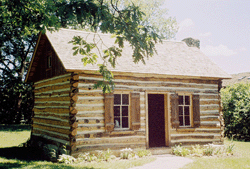 Franklin’s earliest known non-native settlers were Michael and William Sheehan who arrived from County Cork, Ireland, to register a claim in 1834. In 1836, the Sheehan brothers built Franklin’s first European-style log cabin in the 10600 block of St. Martins Road. Later, they were joined by their brother Patrick and his family along with other members of Michael’s family. A two-story addition was attached to the cabin during the 1850s to accommodate additional family members. Michael Sheehan died while rebuilding Holy Assumption Church in 1846, Patrick Sheehan died in 1896, and no records have been found for William Sheehan after 1869. The cabin remained in the family until Dennis Sheehan, the last of Patrick Sheehan’s sons, sold the farm to Michael Godsell in 1911.
Franklin’s earliest known non-native settlers were Michael and William Sheehan who arrived from County Cork, Ireland, to register a claim in 1834. In 1836, the Sheehan brothers built Franklin’s first European-style log cabin in the 10600 block of St. Martins Road. Later, they were joined by their brother Patrick and his family along with other members of Michael’s family. A two-story addition was attached to the cabin during the 1850s to accommodate additional family members. Michael Sheehan died while rebuilding Holy Assumption Church in 1846, Patrick Sheehan died in 1896, and no records have been found for William Sheehan after 1869. The cabin remained in the family until Dennis Sheehan, the last of Patrick Sheehan’s sons, sold the farm to Michael Godsell in 1911.
Michael Godsell and his wife raised five children, including a son, Tom, who bought the farm in 1920. Tom Godsell married Mary Wallace in 1921 and they continued to live on the farm with their seven children until 1967. By this point in time, Franklin was gravitating from a rural to suburban lifestyle and aging farms became attractive to real estate developers. During the 1970s, the Godsell farm was transformed into the Mission Hills subdivision, but fortunately, the original Sheehan-Godsell cabin was recognized as a historic landmark. Through a cooperative venture by the Franklin Historical Society, the City of Franklin and the Bicentennial Commission, the Godsell cabin was detached from the farmhouse and towed to Legend Park in 1975. In a detailed, labor-intensive reconstruction project, the cabin was completely dismantled and reassemble with new timbers in 2004 to preserve its historic integrity.
Old Town Hall
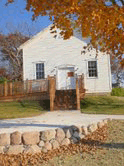 The structure and function of town government was established by legislation passed in 1841. Accordingly, Franklin held its first town meeting April 5, 1842 at the home of J.C. Loomis with 37 individuals listed as voters. For the next 40-plus years, town meetings were held in private homes or public buildings. In November 1884, the township administrators decided a permanent structure was needed. They pledged $900 to build a Town Hall along Ryan Road (Hwy. 100) just west of S. 76th Street and on April 6, 1886, they began holding government activities there. In August 1956, Franklin residents went to the polls and voted to incorporate as a city. That October the City of Franklin elected its first mayor, Robert MacDonald, three aldermen and two justices of the peace.
The structure and function of town government was established by legislation passed in 1841. Accordingly, Franklin held its first town meeting April 5, 1842 at the home of J.C. Loomis with 37 individuals listed as voters. For the next 40-plus years, town meetings were held in private homes or public buildings. In November 1884, the township administrators decided a permanent structure was needed. They pledged $900 to build a Town Hall along Ryan Road (Hwy. 100) just west of S. 76th Street and on April 6, 1886, they began holding government activities there. In August 1956, Franklin residents went to the polls and voted to incorporate as a city. That October the City of Franklin elected its first mayor, Robert MacDonald, three aldermen and two justices of the peace.
As the population increased a fourth ward was created in 1961 and by 1970 fifth and sixth wards had been added. In 1962, Franklin was still 80 percent farmland, but the population had more than doubled over the past decade to 10,000.
The Town Hall took turns functioning as the community’s engineering department, police department and justice court until a new city administration building opened at 9229 W. Loomis Road in 1970. The Town Hall was moved to Legend Park by the Franklin Bi-Centennial Commission in 1976 and was turned over to the Franklin Historical Society to serve as its office and museum in 1980.
Whelan School
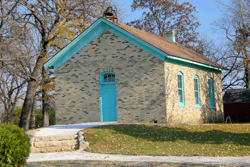 The Whelan School was one of seven schools that sprouted up during the latter part of the nineteenth century to educate Franklin’s farm children. Others were Stargard, Riverside, Green Valley, Willow Edge, German School and Oakwood High School. Whelan was built on land secured from Patrick Whelan in 1852. Electors authorized $173 for construction of a one-room school measuring 24 feet long and 16 feet wide. Orlando Hill was hired to serve as the first teacher for a three month term at a salary of $24.
The Whelan School was one of seven schools that sprouted up during the latter part of the nineteenth century to educate Franklin’s farm children. Others were Stargard, Riverside, Green Valley, Willow Edge, German School and Oakwood High School. Whelan was built on land secured from Patrick Whelan in 1852. Electors authorized $173 for construction of a one-room school measuring 24 feet long and 16 feet wide. Orlando Hill was hired to serve as the first teacher for a three month term at a salary of $24.
In 1878, a new school was needed and Johannah Whelan, the daughter of Patrick, donated land at the corner of Puetz Road and Hwy. 100. A loan of $389 was secured to build the Whelan School and it, along with the Stargard, Riverside and Green Valley schools, continued to serve the community until the school district purchased 10 acres from the William Ludwig farm along S. 76th Street in 1951. In 1953, Whelan, Stargard, Riverside and Green Valley were consolidated and closed when Ben Franklin School opened to serve grades one through eight. The brick Whelan School was purchased by the Franklin Historical Society in 1969 and became the first historic building moved to Legend Park. It is now a living museum, offering classes from Franklin and surrounding districts the opportunity to receive a one-day education in a rural setting of olden days.
St. Peters Chapel
 The St. Peters Chapel was built in 1869 on grounds next to the St. Peters Cemetery on S. 68th Street, just south of Loomis Road. The congregation was founded by the William Boldt, Fred Mueller, Gustave Wendt, John Brown, Charles Spies, Albert Neske, Ernest Kelm and Bertram families who chose to break away from St. Paul’s Lutheran Church on S. 51st Street. In 1874, the typical Sunday collection was 13 cents. The church also served as a school for a time with Rev. Blankenhein, who had living quarters above the Chapel, acting as pastor and teacher.
The St. Peters Chapel was built in 1869 on grounds next to the St. Peters Cemetery on S. 68th Street, just south of Loomis Road. The congregation was founded by the William Boldt, Fred Mueller, Gustave Wendt, John Brown, Charles Spies, Albert Neske, Ernest Kelm and Bertram families who chose to break away from St. Paul’s Lutheran Church on S. 51st Street. In 1874, the typical Sunday collection was 13 cents. The church also served as a school for a time with Rev. Blankenhein, who had living quarters above the Chapel, acting as pastor and teacher.
Since its inception in 1869, the cemetery maintenance was overseen by Fred Mueller and his son who kept records of everyone buried there. The last funeral service held in the Chapel was for Ernest Kelm in 1925. From June 1939 to May 1940 the Chapel was rented by a Hales Corners Lutheran congregation until construction of their Whitnall Park Lutheran Church was completed.
For approximately 25 years, St. Peters Chapel maintained a quiet vigil north of the cemetery. Finally in 1983, the Chapel was recognized as a Franklin landmark, moved to Legend Park, and restored to its original state of the 1860s. Heated by a pot-bellied stove and lit by kerosene lamps, the Chapel is the scene of nondenominational Christmas services each December. The Chapel is also available for weddings and other special events through the Franklin Historical Society.
Delikat Smokehouse
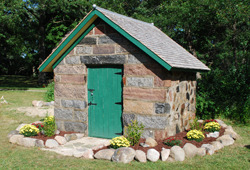 A smokehouse, which was common on many Franklin farms, is the newest addition to the historical area of Legend Park. Between 2011 and 2012 it was dismantled from its original site on S. 51st St. and Drexel Ave. and reassembled in the park behind the chapel.
A smokehouse, which was common on many Franklin farms, is the newest addition to the historical area of Legend Park. Between 2011 and 2012 it was dismantled from its original site on S. 51st St. and Drexel Ave. and reassembled in the park behind the chapel.
Originally it was built by local farmer Herman Delikat in 1891 as the headstone over the door revealed. The stone read “18HD91”. Later ownership of the farm would transfer to the Salchow family and then to Payne & Dolan, owners of the Franklin Quarry.
Donated by Payne & Dolan to the Franklin Historical Society, the smokehouse dismantling began in 2011. The stones from the front wall were removed and numbered, the other walls were torn down and then all was transported to Legend Park. Before winter set in, footings were dug and a foundation poured. In mid 2012 the rebuilding began, erecting the front wall as close as possible to the original one. The headstone was put back in place, a reconstructed front door added and new cedar shingles replaced the worn roof.
The smokehouse now stands near the log cabin and is an example of how people historically preserved food. Meats, poultry, and fish were preserved and products like bacon, ham, sausages and cheese were commonly smoked.
Ludwig Outhouse
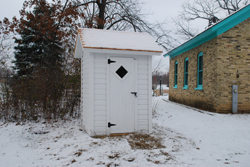 A building considered essential to almost any historic landmark has been added to the Franklin historical site in Lions Legend Park. It is an outhouse.
A building considered essential to almost any historic landmark has been added to the Franklin historical site in Lions Legend Park. It is an outhouse.
While retired from its standard use several decades ago, the two-seater has been located on the S. 68th Street Ludwig homestead since 1908. Fred Ludwig, who began farming in Franklin in 1875, bought his second 80 acres of farmland in 1902. In 1906, he built a barn on the property. Two years later, the home was built to accommodate Fred and Mary Ludwig and their five children. The outhouse was constructed about five yards west of the house.
The two-seat commode continued to serve second generation William and Emma Ludwig and their five children. Fritz one of the five children continued to occupy the homestead until his death at age 87. With Fritz’s death, his widow, Louise Ludwig donated the outhouse to the FHS. The outhouse is now painted white the traditional color of a school’s outhouse and is relocated off the corner of the Whelan Schoolhouse.

You must be logged in to post a comment.